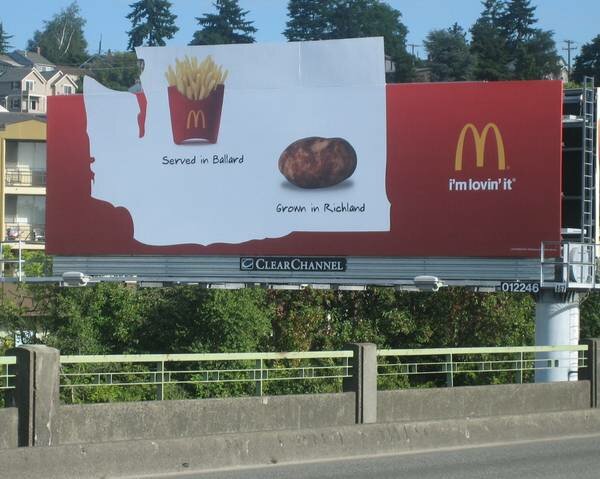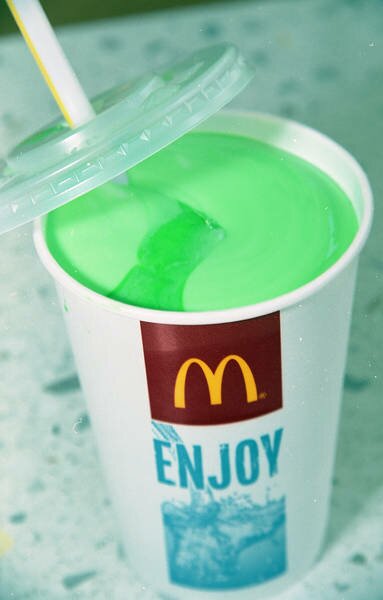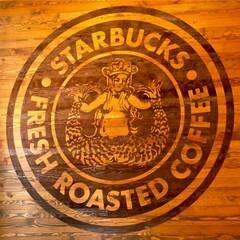 Photo courtesy of Gilman Park blog.
Photo courtesy of Gilman Park blog.
Coincidentally, I happen to be reading Mark Bittman's screed against agribusiness, junk food, and fast food, Food Matters, just as McDonald's "localwashing" ad campaign splashes across Seattle billboards. Gilman Park blog apparently broke the story on July 18, and it is now spreading across the internet. See Grist.com, Change.org, Fast Company, and Web Design Cool for various takes on the fast food giant's blatant and insulting attempt to hitch a ride on the locavore wagon.
The irony of the campaign is that a marketplace such as Seattle, with strong farmers markets, restaurants committed to sourcing locally, and an educated, informed populace, is not likely to respond well. That doesn't really matter. McDonald's has a marketing budget of over a billion dollars, the bulk of which (over $800 million, as of 2006) is spent on U.S. media. That's about 16 percent of gross sales, paid for with every Big Mac, fries, and shake. Test marketing an ad campaign that will be about as successful as their pizza trial a few years ago is just a part of the equation.
What will be significant is the how much media attention the campaign gets, whether the campaign becomes a "teaching moment" for consumers in other markets, and whether other communities heed the warning: Localwashing appears to be the next frontier for advertising. It's certainly easier and cheaper than actually sourcing and using local, sustainable, and organic ingredients. Very, very low hanging fruit for McDonald's, in fact, since the company is the single largest purchaser of beef, pork, potatoes, and apples in the U.S....

I know that St. Patrick's Day has already come and gone (weeks ago now), but Great Beyond just shared a great story about trying to get a Shamrock Shake, via the SunBreak Flickr pool:
Not just my first and last Shamrock Shake of the season - THE last one of the season. Here I am, St Paddy's Day, running all over town, going from McDonalds to McDonalds, trying to find one.
Everywhere I go, the answer is the same "Nope, the company has ran out". Seriously, you run out BEFORE the holiday in question? What the hell!
So I find one that still has the syrup, and he starts pulling my minty green cup o' calories - when the hose starts sputtering and coughing. "Sorry, we're out of 'em it seems."
NOOOOOOOOOOOOOOOO!!!!
But the manager, being the champ that she was, pulled out the jug, poured the rest of the syrup into another smaller cup, put the shake machine sucker pump into the cup and pulled the very last dregs of the season into my shake. Huzzah! My spring has officially begun!
 For more than a decade, Seattle has prided itself on its robust economy and unmatched blend of innovative, successful companies. We’ve had it all. So it’s particularly hard to see a local, homemade Seattle company get whacked and weakened by punch after punch from its competitors.
For more than a decade, Seattle has prided itself on its robust economy and unmatched blend of innovative, successful companies. We’ve had it all. So it’s particularly hard to see a local, homemade Seattle company get whacked and weakened by punch after punch from its competitors.
Starbucks [SBUX] is having a rough recession. They’ve had to close hundreds of stores due to declining sales and have seen their market share shrunk by the likes of McDonald’s and Dunkin’ Donuts.
Today, they’ve taken another smack to the gut from the boys behind the Golden Arches. Starting in January, McDonald’s will be offering free Wi-Fi. What this means is that the company behind the guy in the clown outfit has out flanked Starbucks yet again and gone directly to consumers with something they want and, frankly, demand.
For years Starbucks has stubbornly stuck to the notion that people like their stores and products so much that they will pay for an Internet connection they can find for free at a local café down the street (or now at a fast food chain with much cheaper lattés). In all fairness, Starbucks does offer free Wi-Fi, but only to AT&T Internet subscribers, or if you have a Starbucks card--otherwise, you pay for your time.
This might have made sense four years ago when wireless Internet first made its move towards ubiquity. But the world has changed and customers demand access as a prerequisite for settling down with a hot cup of Joe.
Everyone else, it seems, has recognized that having people stay in your store and probably buy more than one drink, a donut, juice, or a Happy Meal is a very good thing. They probably realize that the income they generate from those incremental sales will pay for the cost the store incurs from an Internet connection.
The bitter irony, pun intended, is that Starbucks invented the concept of the coffee-house-as-office. They created the idea of a comfortable, cozy place to have an espresso and get a little something done. One could argue that the rapid rise of 3G phones is a direct response to people wanting tools that would allow them to be productive while sitting in someplace very much like Starbucks. ...




Most Recent Comments